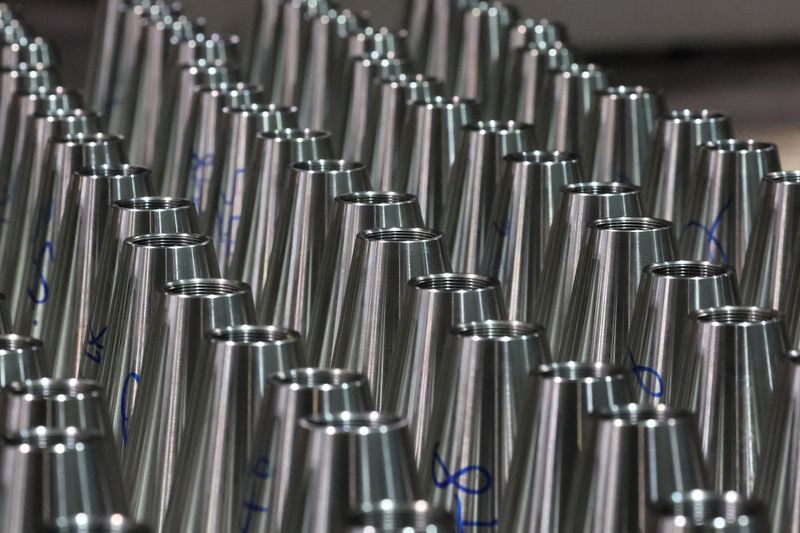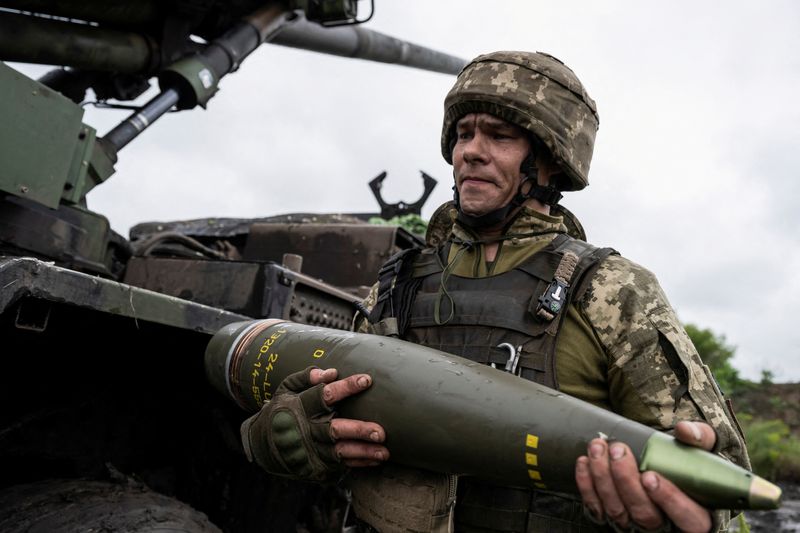By Andrew Gray
BRUSSELS (Reuters) – European Union countries have placed orders for only 60,000 artillery shells under an EU scheme to help get 1 million rounds of ammunition to Ukraine by next spring, according to people familiar with the figures.
The scheme was a centrepiece of an EU initiative to ramp up the supply of vital 155mm artillery shells to Ukraine, allowing countries to place orders with industry through contracts negotiated by the bloc’s European Defence Agency (EDA).
The broader initiative, launched in March, offered various schemes to get 1 million shells and missiles to Ukraine within a year for the war against Russia’s invasion.
Together, those schemes have yielded some 480,000 munitions, according to the EU – less than half of the target, with about four months to go.
The particularly small volume of orders for the scheme at the heart of the programme highlights bigger struggles that the EU is facing in trying to hit the target.
In a sign of concern at the low volume of orders so far, a draft declaration for an EU summit next week “stresses the urgent need to accelerate the delivery of missiles and ammunition, notably under the one million rounds of artillery ammunition initiative”.
Artillery rounds are a crucial element in the war of attrition between Ukrainian troops and Russia’s invasion forces, with each side firing thousands of shells every day.
The European Defence Agency said in September that seven countries had ordered ammunition through the pioneering joint procurement scheme. Lithuania, Denmark and Luxembourg said they were among the seven.
The EDA did not specify the size of the orders. But people familiar with the figures told Reuters on condition of anonymity the total was just 60,000 shells.
Another option for EU members was to deliver from existing stocks, yielding some 300,000 shells and missiles, the EU says.
Other munitions have been ordered through a scheme that allows EU countries to piggy-back onto contracts signed by one “lead nation”.
German Defence Minister Boris Pistorius said last month the EU would miss the 1 million target, echoing a view expressed privately by some diplomats and officials.
But others including EU foreign policy chief Josep Borrell have insisted the goal remains.
Borrell hailed the plan to send 1 million shells to Ukraine within a year as “historic” when it was agreed in March. The initiative allows countries to get partial refunds on their orders through an EU-run fund, the European Peace Facility.
DIFFERENT EXPLANATIONS
Officials and industry leaders have offered different explanations for the EU’s struggle to meet the goal.
Some argue that many governments have simply not backed up their rhetoric about supporting Ukraine for the long haul by placing orders with arms firms.
Others insist that it takes time for industry to ramp up and restart production of such artillery shells, which until recently were not viewed as a priority for modern warfare.
Ukrainian Foreign Minister Dmytro Kuleba said last week he thought the problems were more technical than political.
“People with special knowledge of how things work – how spare parts work, how chains of supply work – they have to sit down and sort it out,” he said.
Some officials have also blamed a decision to restrict the joint procurement drive to companies from the EU and Norway.
Asked whether it could confirm the 60,000 figure, the European Defence Agency said it did not comment on numbers.
The EU’s diplomatic service said only member countries could provide details of orders. But it stressed EU countries were supplying shells via various routes, not just joint procurement.
“Member states continue to deliver artillery ammunition to Ukraine, whether through stocks, redirection of existing orders or new procurement,” spokesperson Peter Stano said in an email.
“The goal to deliver one million rounds of ammunition remains a political priority. We continue to encourage all member states to consider placing orders within the EDA framework contracts, as capacities remain available.”
(Reporting by Andrew Gray; Editing by Alison Williams)

